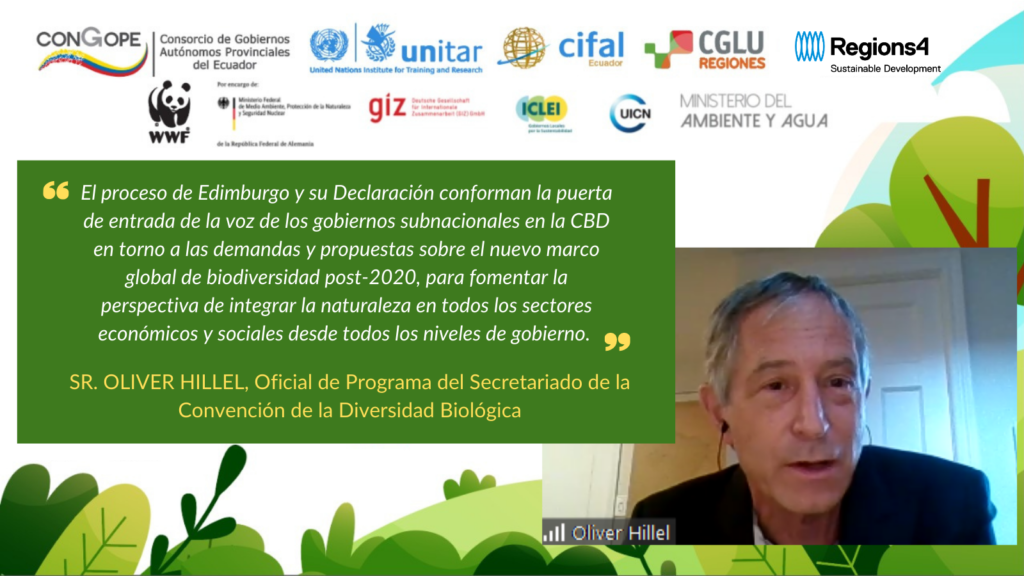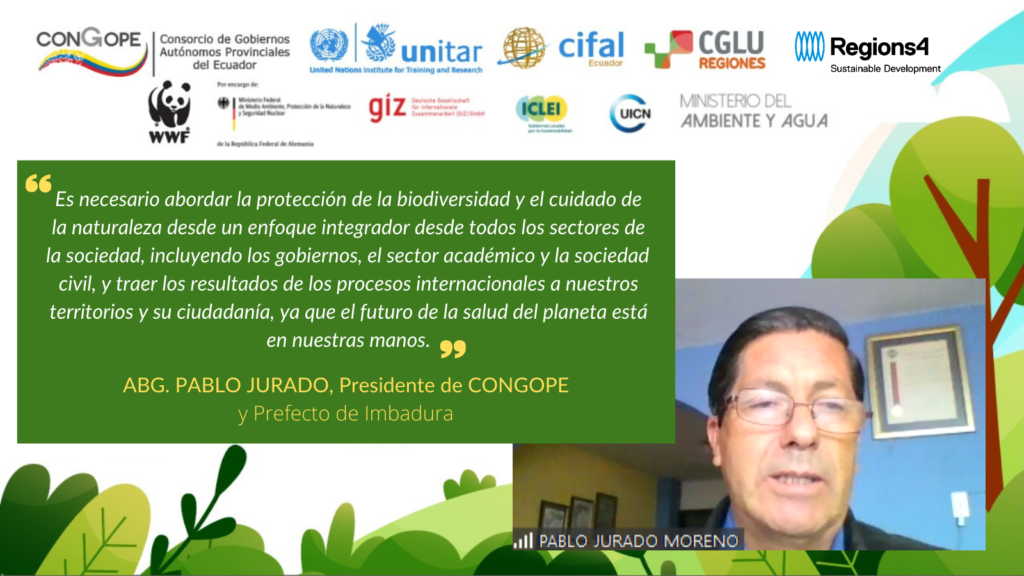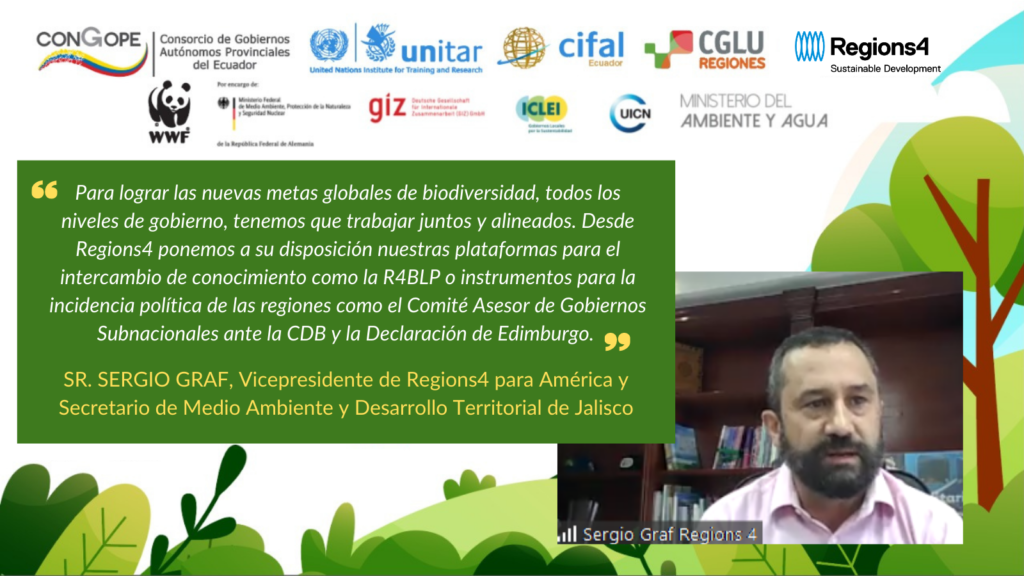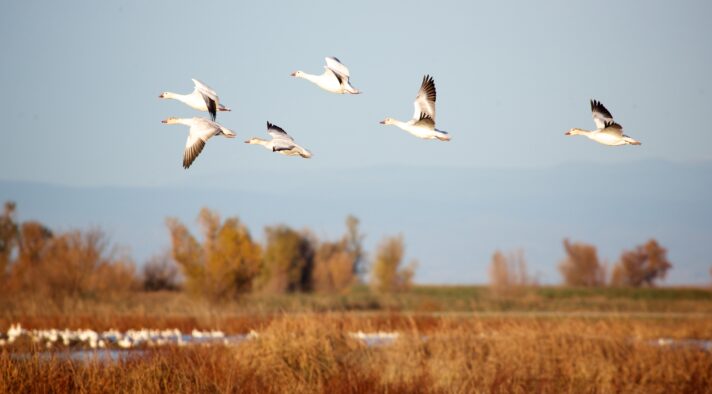As the discussions and negotiations regarding the new post-2020 global biodiversity framework move forward, the constituency of subnational governments continues to mobilise efforts and support towards the approval of a new dedicated decision at COP15 through the Edinburgh Declaration as well as in relevant international and regional fora.
As part of those efforts, the Consortium of Provincial Autonomous Governments of Ecuador – CONGOPE, organised the International Biodiversity Forum “Living in Harmony with Nature” with the objective of promoting the role of subnational governments in the protection and conservation of biodiversity within the post-2020 global framework, as well as facilitating the exchange of experiences and good practices. The event which had the support of Regions4, gathered key partners such as UNITAR, CIFAL, GIZ, WWF, ICLEI, IUCN and UCLG, among others.
A collective vision for a global alliance for biodiversity
Held on 19 – 22 of April the International Biodiversity Forum hosted four different sessions which discussed the role of subnational governments in the global framework of biodiversity post-2020; subnational and local action in biodiversity management; biodiversity and its contribution to mitigation and adaptation to climate change; and the link between biodiversity loss and the transition towards a sustainable future in the pandemic era.
Regions4 was represented by Mr. Sergio Graf, Regions4’s Vice President for the Americas & Secretary of Environment and Territorial Development of Jalisco; Natalia Uribe, Regions4’s Head of Strategic Coordination and Advocacy; Renata Gómez, Regions4 Biodiversity Programme Manager; as well as by members CONGOPE, Campeche, Catalonia, Scotland and Sao Paulo. The event also had the participation of representatives of key organisations such as the Convention on Biological Diversity and IPBES, among many others.
The event kicked-off with a high-level panel on 19 April moderated by Renata Gómez, Regions4 Biodiversity Manager, which included the participation of the Ministry of Environment of Ecuador, the Convention of Biological Diversity, CONGOPE, the State of Jalisco, ICLEI – South America and GIZ Ecuador.

“The Edinburgh Declaration is a key tool to give subnational governments a voice for their demands and proposals on the new post-2020 global biodiversity framework, promoting the mainstreaming of nature in all economic sectors at all levels of government.”
Oliver Hillel, CBD Secretariat

“We must address the protection of biodiversity from a whole-of-society approach and bring the results of international processes to our territories, as the future of the planet’s health is in our hands.“
Pablo Jurado, CONGOPE

“To achieve the new global biodiversity targets, all levels of government need to work together and align in knowledge sharing & advocacy through instruments such as the AC SNG or the Edinburgh Declaration.“
Sergio Graf, Regions4 Vice Presidency for America
The main takeaways from the high-level panel summarised by Regions4 can be found below:
- The importance to foster alliances and find synergies to implement the new global biodiversity framework at all levels of government through a collective vision.
- The new global biodiversity framework is a joint roadmap and local and subnational governments must work to translate the global targets to their levels of governance, working hand in hand with the national governments and, as implementers, demanding the mechanisms and resources to achieve the global targets.
- Subnational governments are invited to join the learning platforms and communities of practice led by organisations such as ICLEI, Regions4 or CONGOPE that already gather governments that lead through innovation, knowledge development and good practices to help promote replicability and scalability. Among those platforms, we highlight the Regions4 Biodiversity Learning Platform (R4BLP).
- Networks that gather subnational and local leaders are essential to the ongoing discussions on the post-2020 framework, and Regions4 welcomes subnational leaders willing to commit to take a part in safeguarding global biodiversity.
- The relevance of continuing to make the most of the CDB’s processes and international fora to shine a light on the inspiring actions already taking place at subnational level. Among the processes which are already interacting with the CBD we must highlight the Edinburgh Process and the Edinburgh Declaration, that continue to gather support towards COP15 and we invite all governments to join this movement.
To revist the main messages, please watch the video below:
The future of cooperation
The “International Forum of Biodiversity” offered the opportunity to gather international networks and organisations, as well as governments representatives from Campeche, Catalonia, Scotland and Sao Paulo, showcasing best practices and reminding the importance of international cooperation to achieve the biodiversity targets.
During her intervention, Natalia Uribe, Head of Strategic Coordination and Advocacy at Regions4, highlighted the importance of working collectively and in an integrated manner to respond to the current global crises, and called participating organisations and governments to join Regions4’s work to integrate biodiversity, climate and sustainable development actions to build back better.

“At Regions4 we work to integrate the response of regional governments in three interconnected areas: biodiversity, climate change and sustainable development. Collaborative platforms such as R4BLP or the ACSNG coordinated by Regions4 are key in this process.”
Natalia Uribe, Regions4
Further information:
To revist the event coverage, please click on the following social media thread.
To know more about the Edinburgh Declaration and join us in calling for greater inclusion of subnational governments in delivering for nature and people, please read the full Press Release available in English, Spanish and French
To learn more about Regions4’s work in biodiversity and our flagship projects click here



